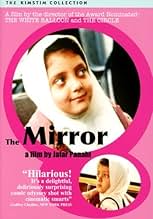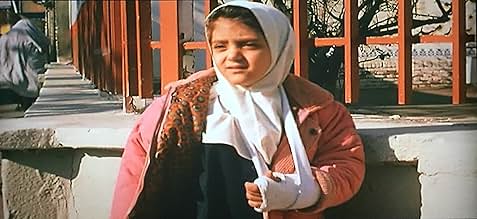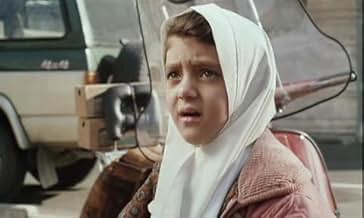IMDb RATING
7.5/10
3.4K
YOUR RATING
When a young girl becomes lost in the hustle and bustle of Tehran, her journey turns into a dazzling exercise on the nature of film itself.When a young girl becomes lost in the hustle and bustle of Tehran, her journey turns into a dazzling exercise on the nature of film itself.When a young girl becomes lost in the hustle and bustle of Tehran, her journey turns into a dazzling exercise on the nature of film itself.
- Awards
- 4 wins & 1 nomination total
- Director
- Writer
- All cast & crew
- Production, box office & more at IMDbPro
Featured reviews
A child (Mina Mohammad Khani) waits in vain for her mother to pick her up after school. Whether she tries to resolve the dilemma herself or asks for help from the adult world, this serious little girl confronts dead-ends. At first She asks help from a motorcycle driver and the guy gives her a lift to the bus-stop then she takes the wrong bus so on and on.She challenges the adult world. "If you can show me the way I can go by myself" is a repeated line in the movie but the adult world does regard her either weak or it doesn't care about her.The close camera shot right on the little girl is very good really and the performance of this little girl deserves a standing ovation. Great job! The only thing is that I felt that the movie lacks a little bit action through the turmoil of urban life. The director focuses on littler girl more than necessary I guess. We hear some external voices (like the people on the bus) but the camera is always on the girl so this feels a little bit passive. Other than that it's really great!
This is a pure concept: Director has chosen to play with two resources: camera and sound. No music, no SFX.
The story itself is quite surprising.
Sometimes, the lower the budget, the greater the creativity. The border between documentary and film is blurred, so the sense of "reality" is quite present and remains till the end.
The director also plays with the audience: there is a certain point when the viewer feels to be misplaced.
As Rene Magritte's painting "la Vengeance", in which the artist does not accept the inherent limitations of his art, he dares to paint outside the easel, that way Jafar Panahi goes beyond the usual simple structure of the movies.
Just for "independent advanced" movie goers.
9/10
The story itself is quite surprising.
Sometimes, the lower the budget, the greater the creativity. The border between documentary and film is blurred, so the sense of "reality" is quite present and remains till the end.
The director also plays with the audience: there is a certain point when the viewer feels to be misplaced.
As Rene Magritte's painting "la Vengeance", in which the artist does not accept the inherent limitations of his art, he dares to paint outside the easel, that way Jafar Panahi goes beyond the usual simple structure of the movies.
Just for "independent advanced" movie goers.
9/10
This is a film about a girl going home. Apparently her mother failed to pick our little heroine up, and the feisty second grader sets out to find her way through the asphalt jungle all by herself. Well, there's more to it of course. It's the asphalt jungle of Tehran and the film was directed by Jafar Panahi, one of the innovative film makers of the Iranian New Wave. Not that his latest works are allowed to be shown in his home country, mind you. Sentenced to a six-year jail term in 2010 and banned from directing he nevertheless defiantly made an iPhone production called "This Is Not a Film" about his situation and managed to smuggle it out of Iran and tell the world.
The Iranian situation as such is already portrayed firsthand in Panahi's early 1997 film. A representative of the next generation, a child, in the center, we witness its abandonment by the adults. We eavesdrop on them complaining, but not really listening, observe the gender segregation on public transport (albeit through an innocent perspective in between as the missing link), but in a sea of scarves, uniform looks and the all encompassing everyday turmoil one can barely get a glimpse of something one could call "individuality"... In the words of Panahi: Everyone is wearing a mask, plays a role. Thanks to the stark realism present in Iranian movies we become part of the life and the hustle and bustle therein, get sucked in by following the odyssey through a child's eye. And we'll reach a point in the film where a clever twist cranks it all even up a notch. Thus a very real situation turns even more real and it results in a powerful reflection with a double meaning, within the film and outside of it. As in his preceding picture "The White Balloon", also centering on a cast of children, the tone in Panahi's "The Mirror" is light, and the film is entertaining throughout, yet layered and thought-provoking. There's someone who stands up to find a way, lost, but determined, wandering around in need for directions. But there's a fundamental difference between directions and direction, as the viewer might notice. No coincidence either that this someone we're talking about is a girl, the focus of some of Panahi's other works. Or let's say it that way: This is not a film... about a girl going home.
The Iranian situation as such is already portrayed firsthand in Panahi's early 1997 film. A representative of the next generation, a child, in the center, we witness its abandonment by the adults. We eavesdrop on them complaining, but not really listening, observe the gender segregation on public transport (albeit through an innocent perspective in between as the missing link), but in a sea of scarves, uniform looks and the all encompassing everyday turmoil one can barely get a glimpse of something one could call "individuality"... In the words of Panahi: Everyone is wearing a mask, plays a role. Thanks to the stark realism present in Iranian movies we become part of the life and the hustle and bustle therein, get sucked in by following the odyssey through a child's eye. And we'll reach a point in the film where a clever twist cranks it all even up a notch. Thus a very real situation turns even more real and it results in a powerful reflection with a double meaning, within the film and outside of it. As in his preceding picture "The White Balloon", also centering on a cast of children, the tone in Panahi's "The Mirror" is light, and the film is entertaining throughout, yet layered and thought-provoking. There's someone who stands up to find a way, lost, but determined, wandering around in need for directions. But there's a fundamental difference between directions and direction, as the viewer might notice. No coincidence either that this someone we're talking about is a girl, the focus of some of Panahi's other works. Or let's say it that way: This is not a film... about a girl going home.
This gimmick was so good that it has never been done again since. It's like going on after a fumble, you pick it up and end the play but it will not be the best, it will not be beautiful but this fumble will get you to score a point. It's an interesting exercise, one that will spark debates because you either go with it or no. I get either side of the fence.
It's not cinema, but it is a meta-commentary on fact and fiction. Don't we always say that "life beats film" - then why is this not the best film ever? You still have to separate the two - or you make a documentary. This feels like due to financial constraints you continue with a mistake, and double down...
It's not cinema, but it is a meta-commentary on fact and fiction. Don't we always say that "life beats film" - then why is this not the best film ever? You still have to separate the two - or you make a documentary. This feels like due to financial constraints you continue with a mistake, and double down...
Monsieur Panahi cannot resist a bit of metafiction. In this case the metafiction becomes the subject of the second part of the movie, as his lead child actress finds herself in the exact same predicament as the girl she was playing, running through the streets of Tehran, talking to all sorts of people, trying to get home. Only it starts to feel a little too gimmicky and I lost interest. Plus the fact that they were watching her from a distance, but still I couldn't help but feel they were endangering her.
Anyway, Tehran traffic is hellish and I'd be scared as an adult, let alone a child. But this kid just cannot sit still to save her life. It's true we would not have a movie otherwise, but basically stay in the playground and wait for your mother to come pick you up.
Anyway, Tehran traffic is hellish and I'd be scared as an adult, let alone a child. But this kid just cannot sit still to save her life. It's true we would not have a movie otherwise, but basically stay in the playground and wait for your mother to come pick you up.
Did you know
- TriviaThe film stars Mina Mohammadkhani, the sister of Aida Mohammadkhani (The White Balloon).
- ConnectionsFeatured in Ceci n'est pas un film (2011)
- How long is The Mirror?Powered by Alexa
Details
- Release date
- Country of origin
- Official site
- Language
- Also known as
- The Mirror
- Filming locations
- Production company
- See more company credits at IMDbPro
Box office
- Gross US & Canada
- $69,915
- Gross worldwide
- $69,915
Contribute to this page
Suggest an edit or add missing content

















